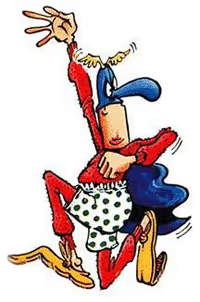Sunday in the Park...George - ACT II
#100Sunday in the Park...George - ACT II
Posted: 9/6/12 at 10:35amYeah, Gaveston, show some gumption and do what After Eight tells you to.
#101Sunday in the Park...George - ACT II
Posted: 9/6/12 at 12:13pm
I just read through this whole thread. And I feel like I've been ass raped by Clare Boothe Luce.
There's a name for you ladies, but it isn't used in high society outside of a kennel.
#102Sunday in the Park...George - ACT II
Posted: 9/6/12 at 12:13pmGaveston, you needn't worry. You're certainly entitled to your opinion. I think we all personalize Sondheim. I'm not sure why, but I know that I do.
#103Sunday in the Park...George - ACT II
Posted: 9/6/12 at 5:37pm
Thanks, guys, and LOL, Regi.
This may shock ya'll, but in 1984, I didn't know a single person who thought the show was anything but undisciplined and pretentious. At Joe Allen's after the opening, the entire room was paraphrasing Mary Martin, "That dear boy has lost his talent!" This is not to say the opinions expressed in posts above are not my own, but they were widely shared with people I knew in 1984.
When, however, almost 30 years later, a number of people I respect say I should take a fourth look at SUNDAY, I see nothing wrong with agreeing to do so. Sondheim remains my favorite composer and lyricist; it only makes sense to take another look at his one major work I never enjoyed. (Unless someone forces the damn CD into my hand, however, I draw the line at DO I HEAR A WALTZ?)
One caveat: I cannot promise that I will make it past the part where Mandy Patinkin begins to bark!
Updated On: 9/6/12 at 05:37 PM
#104Sunday in the Park...George - ACT II
Posted: 9/6/12 at 5:57pm
Well, for Sunday, the score was a huge departure for Sondheim. It was a change in sound, heavily influenced by Steve Reich (particularly "Octet").
But this was the turn in the road where he went to the next level creatively. No longer would his shows sound like Night Music or Sweeney or Follies or even Merrily. And I don't think audiences were expecting that (especially if they hadn't had a taste of it first at Playwrights Horizons).
I remember hearing the score for the first time and being shocked by it, and not necessarily in a good way. I was fascinated by the repetitive dissonance and the unresolved chords that after a few repeated cycles began to "make sense" musically.
Still it was so different. For me, an acquired taste that I took to very quickly. For others, they never took to it and never wanted to. They were content saying things like, "he's lost his talent."
He just changed his pallet, that's all. I'm grateful that he did.
I've been listening to the audio commentary on the DVD, recorded by Sondheim, Lapine, Patinkin, and Peters. So many wonderful stories and perspectives on how this all came together. Parts they love, parts they wish could be redone. They talk about how "weird" the show was ... not "bad weird" but "different weird."
Sondheim talks about the "connection" that is so important and how that word "connect" is spoken at key moments. He also talks about the importance of the notebook, and how that wasn't at all part of the Playwrights production. It was John Guarre who suggested that Dot learn to read sitting in the park during Act I, and then it was Lapine who took her notebook as a way to bring Dot's presence into the second act, through the notebook.
That's the moment when the whole show came together.
Also interesting ... immediately after the musical closed, there was talk of doing a movie of it, directed by Lapine, staring Mandy and Bernadette. Lapine turned it down flat, and the rest, as they say, isn't history.
I like Mandy's observation about that: he says if we'd done the movie, you might not have written other things we know and love today. So it all worked out.
blocked: logan2, Diamonds3, Hamilton22
#105Sunday in the Park...George - ACT II
Posted: 9/6/12 at 6:11pm
"As Mordden relates, people who love theatre were stimulated by it, those who were looking for the standard tired businessman's show were baffled. "
One of the reasons I don't like Mordden. While his books appear to be historical, they often devolve into stating his personal facts as opinions.
#106Sunday in the Park...George - ACT II
Posted: 9/6/12 at 8:14pmIt's true, Matt. I am hardly the stereotypical "tired businessman looking for chorines with nice legs".
#107Sunday in the Park...George - ACT II
Posted: 9/6/12 at 8:26pm
Interesting account, best12, and I'm sure true for many people. But I promise you that after the five Sondheim shows that came before, I walked into each new Sondheim musical with no expectation whatsoever about the music.
And I did see the workshop a few days before they added Act II. I found the music pleasant (if not stunning like SWEENEY or FOLLIES), but the drama inert. It's basically a story about a woman* who settles for second best because the man of her dreams ignores her. Sort of FANNY without the complication of the bio-father's return in Act II. (And, trust me, FANNY is not at the top of my list of most compelling musical dramas.)
*And that's probably where we differ: I realize that for many it is the story of the creation of a painting. But I'm usually more concerned with people than painted figures.
I didn't see Act II until opening night on Broadway and the damn chromolume overwhelmed whatever else was going on after "It's Hot Up Here." I could only think of David Merrick's famous dictum that the public doesn't care about the private problems of artists. Since that opening night, I have heard enough versions of "Move On" to fall in love with it, but I'll be honest and say I don't remember most of Act II.
But for me, it was never the music of either act that was the problem.
#108Sunday in the Park...George - ACT II
Posted: 9/6/12 at 9:16pm
I agree with one thing: that Act II takes a bit too long to get to the heart of what it's trying to say.
And honestly, "It's Hot Up Here" is cute and entertaining, but the point that these painted subjects are "frozen" for all time (and uncomfortable about it) is made in about 20 seconds, tops.
I do love the scene that immediately follows it, where the people in the painting talk about Seurat's death and the legacy of his work. That's pretty fantastic to watch (and a bit chilling) as each of them leaves the stage.
Then we jump time to 1984 and the museum fundraiser. This scene is needed only to establish the characters of George and Marie and show what he's up against as an artist in today's world. The other characters are more or less superfluous. They make interesting points and mostly serve as foils for George. I think this scene (including a little bit of Putting It Together) could be trimmed down ... but not cut entirely.
THEN ... you get to the heart of Act II, when George and his assistant make the trip to Paris and visit the Island of La Grande Jatte.
From this scene on, I think it's absolutely brilliant. I wouldn't change one word or note, or trim anything down.
It's a masterpiece of musical theatre and brings the entire show together. Without this, Act I loses its true payoff.
blocked: logan2, Diamonds3, Hamilton22
#109Sunday in the Park...George - ACT II
Posted: 9/6/12 at 10:55pm
My friend, didn't you just dismiss half of Act II? I'll concede that Sondheim and Lapine are talented enough to make a masterpiece out of the remaining 75%, but that's quite a concession to make.
I'm sure you can imagine why some of us can't get past the chromolume (even while you disagree). LOL.
(It's interesting to try to imagine my own reaction if I had seen ITW--where I spent considerable time defending Act II to my friends--first and SUNDAY second. I might have seen the latter very differently.)
Updated On: 9/6/12 at 10:55 PM
#110Sunday in the Park...George - ACT II
Posted: 9/7/12 at 1:49am
My friend, didn't you just dismiss half of Act II?
No, I didn't dismiss it! Wow, is that really what you got out of that? I'm surprised ... and disappointed.
I said it could be tightened "a bit" here and there to get to the heart of the story quicker, and I pointed out where those cuts might be made.
I did NOT, however, dismiss it.
blocked: logan2, Diamonds3, Hamilton22
#111Sunday in the Park...George - ACT II
Posted: 9/7/12 at 2:05am
Gav, you seem to think in bold terms of "black and white," "love and hate."
If I say something could perhaps use a little finessing or tightening, that doesn't mean I "dismiss" it.
I know you're not the only one who thinks in these easy-to-label extremes, but I do find it frustrating when trying to discuss something. I have the same problem when I try to convey my opinion of "Follies." I have a big issue with the premise as it is presented by Prince, Goldman, and Sondheim, yet I think the score, song by song, is one of Sondheim's best. Does that mean I hate "Follies?" No. Does that mean I love "Follies"? No.
I can't give you (or anyone) an easy answer to slap a label on in one crisp sentence.
With Sunday, I love it exactly as written. I don't mind that Act II takes a bit longer to get to the heart of its story, but I concede that it does, and I offered up suggestions on how/where to tighten it "a bit." Still, I think it's just fine as is, and the payoff during the second half of the act is well worth the wait and the journey to get there.
If you have to slap a "crisp sentence" label on that opinion, go with "I love it!" Which isn't the full answer, but it's a lot better than "I dismiss it." I would prefer the genuine answer, however.
blocked: logan2, Diamonds3, Hamilton22
#112Sunday in the Park...George - ACT II
Posted: 9/7/12 at 2:16am
This was the 2nd Sondheim show I saw when I was 11 (INTO THE WOODS being the first) and I've adored it since, both acts. For me it was FOLLIES and NIGHT MUSIC that took me a long while to enjoy.
But I'd like Kad & After Eight to pick up their argument because thats more interesting to me than the outdated laser show in Act 2.
#113Sunday in the Park...George - ACT II
Posted: 9/7/12 at 2:20am
Hey, I love my outdated laser show in Act II! Almost as much as I love the entirely outdated "Flashdance." But that's another thread.
It's funny on the DVD commentary for Sunday, they (Sondheim, Lapine, Patinkin) go off on Mary D'Arcy's outdated '80s hairdo in Act II. LOL
blocked: logan2, Diamonds3, Hamilton22
#114Sunday in the Park...George - ACT II
Posted: 9/7/12 at 2:23amThat commentary grates my nerves. I keep wishing someone would tell Mandy to just shut the hell up for 2 seconds and then tell Bernadette to open her mouth and say something other than "oh..." or "I forgot about that".
#115Sunday in the Park...George - ACT II
Posted: 9/7/12 at 2:36am
Mandy and Sondheim keep interrupting each other. And both of them cut off Bernadette repeatedly, but she really doesn't have much to say. Once or twice she opened up about something (like how frustrated she was when she first heard the opening number and wondered what she had gotten herself into with all those lyrics). Then she was cut off by Lapine.
I still loved listening to it. Some wonderful information there.
Favorite moments:
Sondheim explaining how he collaborates with orchestrators. He doesn't ever dictate specifics, like "I think a cello would be good here." He told Tunick that for Night Music, he wanted it to sound like wonderfully expensive French perfume was rising up from the pit. Tunick responded with, "Oh, you want a lot of strings!" He said that Starobin was orchestrating his first Broadway show, and his first Sondheim show as well. He tended to overdo initially. Sondheim said that his own piano accompaniments are generally "thick" with many details and a lot going on in them. They don't need embellishments or sections "filled in." He says with his shows, "less is more" for the orchestrations. It's not about bridging gaps.
I loved how Mandy almost quit the show just before previews started because so much of his material still hadn't been written and he began to freak out about it. They told him to bring his agent and his wife to a rehearsal before he made his final decision and get their opinion. He agreed, and they both told him, "You have to do this. You can't quit now." So he didn't.
I love hearing how whole songs and scenes were written and then either scrapped entirely or pared down to one or two lines in the end, particularly in Act I.
I loved hearing how Michael Bennett came to see the show to offer some notes. Sondheim was grateful that he didn't say anything about the plot or score itself (as in, I think George needs to be more "this" or Dot more "that".) He was very specific with things like, "Have Dot turn upstage at the end of that song." They all said he helped with little things, here and there, quite a bit.
blocked: logan2, Diamonds3, Hamilton22
#116Sunday in the Park...George - ACT II
Posted: 9/7/12 at 3:05am
The discussion on the show is great. Keep it up.
Although I am thoroughly perplexed by the bizarre aggression toward people who don't TOTALLY love it.
And the idea it's this otherworldly, impossibly intellectual, inaccessible gem that only the elite can warm up to is, as usual, unwarranted (to be fair, only a few here are pimping that notion and it's none of the members above this post). Saw the show in 2007. It was nifty. It was creative. It was accessible. It had quirk...and kitschy chromolume.
#117Sunday in the Park...George - ACT II
Posted: 9/7/12 at 6:10pm
best12bars. Dude! It is I who am disappointed. I thought I had found the one person on the planet who could love SUNDAY without totally losing his sense of humor (and perhaps his mind).
You divided Act II into four (admittedly uneven) sections and then criticized two of them.
I responded with a joke about dismissing "half" of the act, yet acknowledged that the authors in question probably could drop half an act and still make a masterpiece.
And somehow that morphed into how I see everything in black and white.
Which is particularly bizarre given how many threads we have here where Pal Joey or one of his friends attacks me for even oblique references to French post-structural dramatic theory.
I KNOW you didn't say we should throw out half of Act II. It was a joke.
#118Sunday in the Park...George - ACT II
Posted: 9/7/12 at 6:13pm
Ha, I think the commentary is a blast. As mentioned, Sondheim's comment how if someone randomly walked into the theatre they'd simply think "this is VERY weird", and how Mandy keeps interrupting and wanting to tell stories and Sondheim calmly but firmly corrects him, etc. The DVD is perfection--my only gripe is it suffers (especially on a good sound system) from audio bleed or whatever--something that can happen for things filmed on video where you hear a faint "echo" *before* the line or noise happens.
Sunday was probably the second Sondheim show I "saw"--having seen Act II of ITW first on TV when I was 10 or 11 (and then being mad for a few yars because back then, due to a special deal with Pioneer, it was only available on Laserdisc, finally someone made me a copy of the video--and soon after it came to video anyway). Sunday was in my rental store (later on, I tracked down copies of Sweeney and even Night Music's film at various other video rental places around the city). So maybe the sound didn't sound all that strange to me since I was indoctrinated to Sondheim with ITW, not his 70s shows--and I mean at the time I was studying with a violin teacher who was obsessed with Bartok, so nothing sounded all that modern to me.
Poor, gumption-less Gaveston, surrendering so easily to the Cult of Sondheim. *shakes head*
#119Sunday in the Park...George - ACT II
Posted: 9/7/12 at 6:28pm
Gav, seriously ... this is what you said:
"My friend, didn't you just dismiss half of Act II?"
No, I didn't, nor did I misinterpret that statement or overreact to it. You said I "dismissed" half of Act II, and I explained that I did not. No misinterpretation there. It's your words, not my interpretation of them.
Perhaps you should choose your words more carefully if this isn't want you really meant.
And Eric, I know what you mean about the "bleed." It kinda drove me nuts a bit, especially during the quiet parts of Act II. I could hear Bernadette 10 seconds before she said her line. Oy!
blocked: logan2, Diamonds3, Hamilton22
#120Sunday in the Park...George - ACT II
Posted: 9/7/12 at 6:29pm
I know. When in every thread before this, I have expressed nothing but HATRED for Stephen Sondheim!
What is it about SUNDAY that it's never enough to acknowledge the skill of its creators. It's never enough to like the show. Or even love it!
ONE. MUST. LOVE. IT. ENOUGH!
Jesus Christ! I don't burst into tears and wet my pants every time somebody criticizes some aspect of FOLLIES, a show that has taken far more critical hits over the years!
#121Sunday in the Park...George - ACT II
Posted: 9/7/12 at 6:37pm
Gav, seriously ... this is what you said:
"My friend, didn't you just dismiss half of Act II?"
Yes, if you misunderstood, I will have to take the blame, because I thought I was quite clear.
1. I threw in the words, "My friend", to indicate that I was speaking cordially and with affection, not leaping to win a point in a formal debate.
2. I phrased the sentence as a question, again as opposed to a statement of triumph in a rhetorical duel!
3. I used the negative form of the verb to suggest that perhaps I was perceiving something quite opposed to objective reality.
Are you seriously saying you can't find the joke and/or irony in that sentence? Not even now that it has been pointed out to you? Not considering that you and I have been pleasantly exchanging views for several pages now? Am I the only one on this board who has a sense of context?
Updated On: 9/7/12 at 06:37 PM
#122Sunday in the Park...George - ACT II
Posted: 9/7/12 at 6:39pm
Wow, okay.
I have no problem that the show didn't move you, or even if you thought it completely sucked (which you didn't). I don't have a problem with that either way.
You went off the deep end on MY post, and THAT's what I have a problem with. Your interpretation of my impression, not your impression.
Got it? You were way off target by saying I dismissed Act II. That' has NOTHING to do with what you thought of the show yourself.
EDIT: And if you were "joking," no, it wasn't remotely clear, nor does it indicate a sense of humor. Just a complete misunderstanding.
blocked: logan2, Diamonds3, Hamilton22
#123Sunday in the Park...George - ACT II
Posted: 9/7/12 at 6:47pm
Dear best12bars,
It was one question of ten words. A question I retracted immediately when you complained.
I cannot pretend to understand why it upset you so, but I am deeply sorry I caused a misunderstanding--particularly because that misunderstanding was with you.
Please accept my apology.
Yours sincerely,
GavestonPS
P.S. I didn't say you had "dismissed Act II". I ASKED if you had by chance dismissed HALF of Act II? Why am I the only one who is held to every bloody word of every goddamn post?
Updated On: 9/7/12 at 06:47 PM
#124Sunday in the Park...George - ACT II
Posted: 9/7/12 at 6:48pm
his may shock ya'll, but in 1984, I didn't know a single person who thought the show was anything but undisciplined and pretentious.
And in 1984, I didn't know a single person who thought the show was anything but gorgeous and brilliant.
I don't know what kind of jaded cynics you knew back then, but I imagine they were the kind of people I studiously avoided.
Which is not to say my friends were saints or anything. I would say we were a pretty average 20-something bunch of show queens, and we were each and every one of us flabbergasted by the brilliance, feeling lucky each time we got to see it, and hanging on to every piece of news about its development as one of us or another of us saw each advancing performance. We knew that the second act wasn't the kind of flawless gem that the first act was, but what else in life is? We knew that, whatever they did to the second act, it was nothing anything at all kike the fiasco that Merrily had been.
But "undisciplined" and "pretentious"? No one thought that.
No one.
Videos









